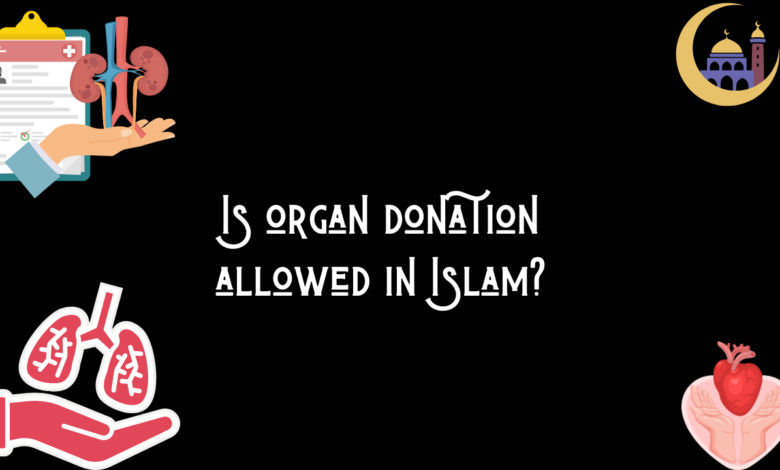Is organ donation allowed in Islam?

Organ Donation in Islam: Balancing Compassion and Religious Ethics
Organ donation has emerged as a remarkable medical advancement that can save and improve countless lives. However, discussions around the permissibility of organ donation within various religious contexts are important, as they involve not only medical and ethical considerations but also deeply held spiritual beliefs. In Islam, the topic of organ donation has generated a range of perspectives, reflecting the diversity of interpretations within the Islamic community.
The Sanctity of Life: A Fundamental Islamic Principle
At the core of Islamic ethics lies the sanctity of human life. The Quran emphasizes the significance of preserving life and condemns any action that directly harms or takes a life unjustly. This overarching principle underlines the potential religious support for organ donation, as it aligns with the goal of saving lives and alleviating suffering.
Variability of Interpretations
Islamic jurisprudence, or Fiqh, consists of various schools of thought, and interpretations of Islamic teachings can differ. Some scholars and Muslim organizations advocate for organ donation as a charitable act that demonstrates compassion and solidarity with those in need. They argue that donating organs after death or even during one’s lifetime to save another’s life can be considered an act of great virtue in Islam.
Purity and Respect for the Body
One concern raised in discussions about organ donation in Islam relates to the concept of bodily integrity and respect for the deceased. Some scholars who express caution about organ donation highlight the importance of maintaining the dignity and purity of the body after death. They argue that the body should be returned to the earth in the condition in which it was created. However, supporters of organ donation counter this by suggesting that the act can be seen as a continuation of one’s compassion and care for others even after death, and that this intention can offset any perceived violation.
Consent and Beneficence
Islamic teachings emphasize the importance of consent and intention in all actions. If a person willingly donates their organs during their lifetime or expresses their willingness to donate after death, it can be seen as an act of beneficence and charity. In Islam, the concept of “Niyyah” or intention is significant; if the intention is to save a life and alleviate suffering, the action can be seen as morally commendable.
Emerging Fatwas and Contemporary Perspectives
Over the years, various Islamic authorities and scholars have issued fatwas (religious rulings) on organ donation. These rulings have ranged from unequivocal support for organ donation as a charitable act to more cautious endorsements with specific conditions. Some fatwas suggest that organ donation is permissible as long as it does not harm the donor’s health and is done with proper consent.
Conclusion
The permissibility of organ donation in Islam is a topic that invites diverse viewpoints and interpretations, reflecting the richness of Islamic jurisprudence. While some scholars and believers see organ donation as a noble act of compassion that aligns with the principles of preserving life and helping those in need, others approach the subject with caution due to concerns about bodily integrity and the sanctity of the deceased. As medical science advances and ethical discussions evolve, it is important for individuals, communities, and religious leaders to engage in open dialogue, seeking a balanced understanding that takes into account both the compassionate aspect of organ donation and the respect for religious beliefs. Ultimately, the decision to donate organs is a deeply personal one that requires careful consideration of both medical and spiritual dimensions.
Frequently Asked Questions (FAQs) about Organ Donation in Islam
Is organ donation allowed in Islam?
Yes, organ donation is generally considered permissible in Islam, as long as certain conditions and principles are followed. The consensus among Islamic scholars is that saving a life takes precedence over preserving the body after death.
What is the basis for organ donation being permissible in Islam?
The principle of “Maqasid al-Sharia,” which emphasizes the preservation of life and the alleviation of suffering, is the foundation for organ donation being allowed in Islam. Additionally, the concept of “Ihsan” (acts of kindness) encourages Muslims to show compassion and benevolence towards others.
Are there specific organs that can or cannot be donated in Islam?
There is no unanimous agreement on specific organs. However, organs that are vital for survival, like the heart, are generally not considered for donation, as they would result in the donor’s death. Non-vital organs, like kidneys, liver, and corneas, are more commonly donated.
Can organs be donated from a living donor?
Yes, organ donation from living donors is allowed in Islam under certain conditions. The donor’s consent is essential, and the donation should not harm the donor’s health or well-being. Additionally, there should be a genuine intention to help the recipient without any material gain.
Can organs be donated after death?
Yes, posthumous organ donation is generally permissible if the deceased had given explicit consent before their death or if their close family members approve it. The consent of the deceased, if documented, should be respected.
Is it required to obtain explicit consent from the deceased for organ donation?
While explicit consent from the deceased is highly recommended, some Islamic scholars consider the consent of close family members to be sufficient, especially if the deceased’s wishes were not known or documented.






